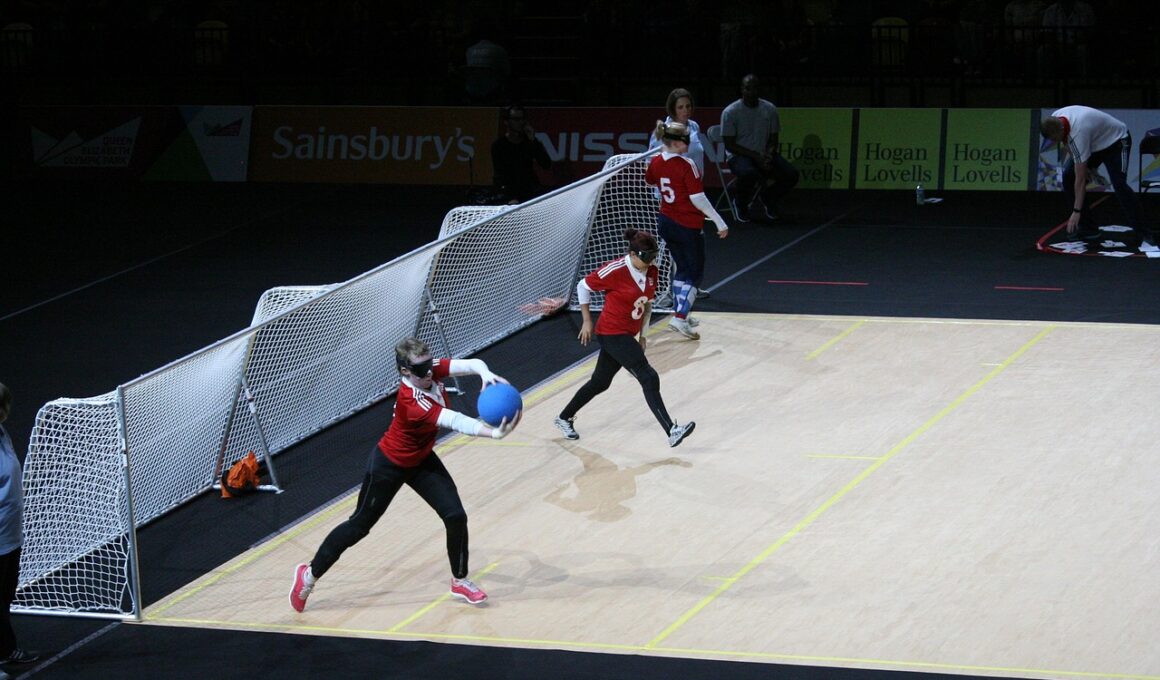Using Goalball to Promote Coordination Skills in Visually Impaired Children
Goalball is a specialized team sport designed to enhance coordination and teamwork among visually impaired children. This game not only fosters basic athletic skills but also promotes self-esteem and physical fitness. By engaging in Goalball, children can improve their spatial orientation, balance, and coordination. The sport involves players wearing blindfolds to ensure a level playing field, which allows them to rely on sound and tactile feedback. This unique approach encourages children to develop keen listening skills while navigating the court. The auditory cues of the ball provide essential information that helps players anticipate its movement. Since the game is played in teams, children learn how to communicate effectively to strategize and support each other during the game. This sense of camaraderie contributes to their social development as well. Goalball can be played in different environments, from schools to community centers. Each game offers a valuable experience, instilling confidence in children as they master the challenges presented to them. Furthermore, the excitement of competition is a powerful motivator that keeps children engaged and eager to hone their coordination skills.
Moreover, participating in Goalball allows visually impaired children to foster resilience and adaptability. In every game, unexpected events can challenge players, leading them to think critically and react swiftly. These experiences play a significant role in building their mental fortitude, which is crucial both on and off the field. The ability to face and overcome challenges fosters a growth mindset, enhancing their overall quality of life. Through repeated practice in a supportive environment, children experience notable improvements in their balancing abilities and coordination skills. Coaches and educators can implement customized training sessions focusing on individual needs, ensuring everyone benefits maximally from the activity. Such tailored approaches can address specific areas for improvement while nurturing each child’s unique capabilities. Besides direct athletic benefits, engaging in Goalball helps children understand the importance of teamwork and collaboration in achieving common goals. This not only enriches their sports experience but also prepares them for social endeavors outside of sports. Parents, too, can play a vital role by encouraging participation in Goalball, bridging their children’s experiences on the court with lessons learned in everyday scenarios.
Enhancing Spatial Awareness in Children
Spatial awareness is vital for all individuals, especially for children with visual impairments. Engaging in Goalball significantly enhances this vital skill through practical implementation. Children learn to gauge distances, anticipate movements, and adjust their own actions accordingly by following the sound of the ball. This process promotes an understanding of their body in relation to their surroundings, fostering greater confidence within various environments. As they engage in the practice of intercepting and throwing the ball, they refine their coordination skills in precise and constructive ways. Additionally, sustained participation results in physical benefits such as improved gross motor skills and agility. The sport also helps children build proprioceptive abilities, allowing them to better control their movements. With time, players become more versatile in their actions, showcasing enhanced balance when navigating the court or responding to team dynamics. Practicing these physical abilities can translate to greater independence outside of sports. Moreover, spatial awareness gained through Goalball allows children to integrate into everyday scenarios confidently, whether crossing a street or navigating crowded public spaces. Such essential life skills empower them to lead a more fulfilling life and participate actively in society.
Additionally, Goalball promotes a strong sense of inclusion among visually impaired children. The sport is recognized globally and offers them an opportunity to compete at various levels, from local leagues to international championships. This inclusivity fosters a welcoming community for children to make new friends and establish connections. The atmosphere surrounding Goalball events allows participants to witness the achievements of their peers, reinforcing motivation and aspiration. Witnessing success creates a ripple effect, encouraging others to push their limits and achieve personal milestones. As these children navigate the demands of the sport together, they cultivate friendships based on shared experiences and mutual support. Beyond the sport itself, their involvement can promote advocacy for inclusivity and accessibility within society. By showcasing their skills and talents, they challenge societal perceptions of disability, proving that visually impaired individuals can thrive in competitive environments. Engaging in Goalball creates a broader context for children to learn the critical importance of empathy, acceptance, and support for all individuals. They encounter new ideas and perspectives while building the stronger foundations needed for personal growth and self-discovery. Ultimately, the impact extends far beyond the court, positively influencing all aspects of their lives.
Fostering Teamwork and Social Skills
One of the most significant outcomes from participating in Goalball is the promotion of teamwork and social skills. As children play in organized groups, they discover the importance of collaboration, understanding their roles, and leveraging each other’s strengths to achieve common goals. This social interaction is invaluable, as it allows them to improve communication skills and learn conflict resolution through guided or independent play experiences. The dynamic nature of the game necessitates constant talk among teammates who are communicating their position, adjusting strategies, and cheering each other on. Such interactions bolster social relationships and empower visually impaired children with essential interpersonal skills needed for future engagements. As they learn to navigate the diverse challenges presented by collaborative sports, these children naturally develop patience and empathy toward peers with unique needs. Forming these connections contributes to building a supportive community, one where they feel valued just as they are. The friendships formed through Goalball encourage positive reinforcement and motivation, further enhancing their coordination skills within this safe environment. As they grow, these social experiences become lasting memories that create a network of friendship and support expanding well beyond the game.
Furthermore, introducing Goalball in educational settings can significantly benefit children’s overall learning experiences. Schools can adopt Goalball as a part of their physical education curriculum, promoting inclusive practices among all students. By facilitating workshops and training for teachers, schools can emphasize the importance of sports accessibility and engagement for visually impaired students. Educators can orchestrate joint integration sessions where visually impaired children participate alongside their peers, bridging the gap between different abilities, and reinforcing unity. Such inclusivity promotes greater understanding and appreciation for diversity among students, strengthening friendships as they engage in shared experiences. Additionally, the incorporation of Goalball encourages physical fitness and healthy lifestyle choices, improving students’ overall well-being. The sport instills in all students discipline, responsibility, and perseverance—qualities that extend into their academic pursuits as well. Having the opportunity to play Goalball allows visually impaired children an avenue to showcase their competitive spirit while gaining valuable life experiences in a structured yet fun environment. The crossover benefits of incorporating such activities ensure children develop essential skills, paving the way for success as they transition into adulthood while remaining truly integrated in society.
Long-Term Benefits of Participation
Overall, engaging in Goalball provides numerous long-term benefits for visually impaired children beyond immediate physical improvements. Participation helps to cultivate self-discipline and dedication, fostering habits that will serve them throughout their lives. The skills acquired—from enhanced coordination to improved teamwork—become transferable skills utilized in diverse settings. Many individuals who participated in Goalball report increased confidence levels within various aspects of life, continually applying lessons learned on the court during everyday situations. Fundamental social skills gained through teamwork and collaboration further enhance these children’s social lives as they develop lasting friendships and networks of encouragement. In a world that can often be isolating for those with visual impairments, finding community becomes an essential aspect of mental well-being. By forging connections and engaging socially through sports, these children can lead fulfilling, productive lives. Additionally, organizations dedicated to Goalball often provide continued support and development opportunities, ensuring sustainable involvement. This commitment to the sport enables ongoing growth and skill refinement for participants striving toward their personal best. Children are not only learning how to play— they are ultimately preparing for life’s many challenges, armed with the confidence gained from their experiences on and off the court.
In conclusion, using Goalball as a recreational activity offers immense advantages in promoting coordination skills for visually impaired children. The sport establishes a platform for physical development, while simultaneously addressing emotional, social, and cognitive aspects. Through tailored training, supportive environments, and enjoyable engagement, visually impaired children can practice and refine their coordination skills effectively. Emphasizing the importance of inclusivity, Goalball encourages children to embrace their potential and gain confidence in their abilities. The benefits gained in balance and coordination through regular participation ultimately contribute to improved self-esteem. This holistic approach ensures that visually impaired children have access to enriching experiences, while also enjoying the camaraderie that comes from teamwork. Moreover, as families, educators, and communities support the program, a broader impact takes shape—creating positive change in the perceptions surrounding disabilities. The journey of visually impaired children participating in Goalball is an inspiring testament to adaptability rewarding persistence, perseverance, and growth within diverse environments. Accessible sports like Goalball can foster unique pathways to success, enabling children to navigate their world with confidence built from their remarkable athletic achievements.


